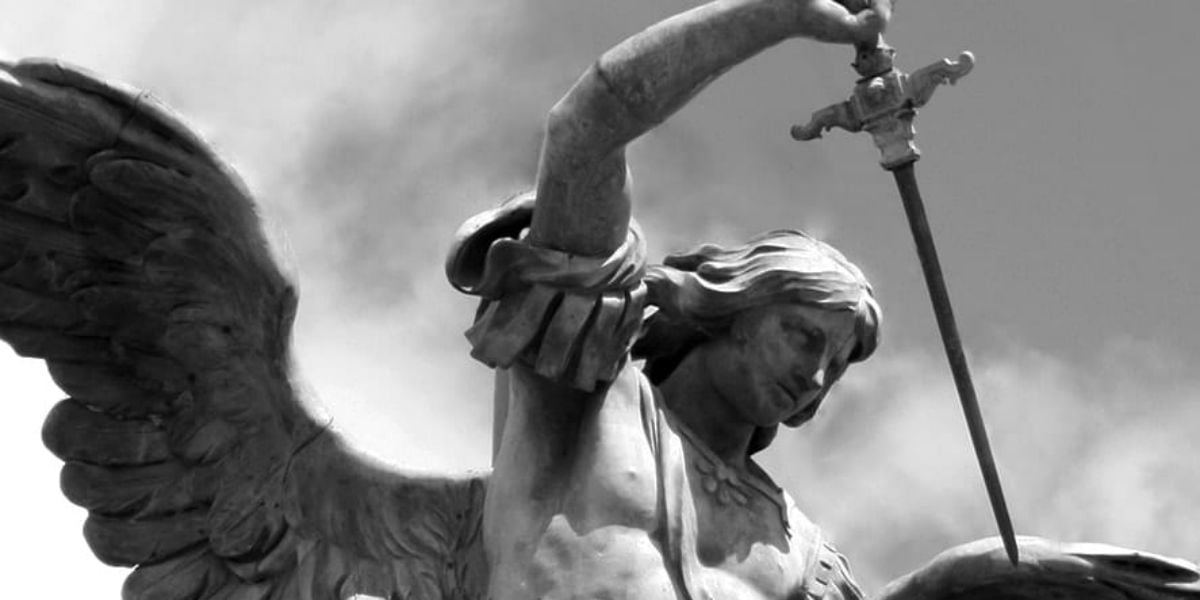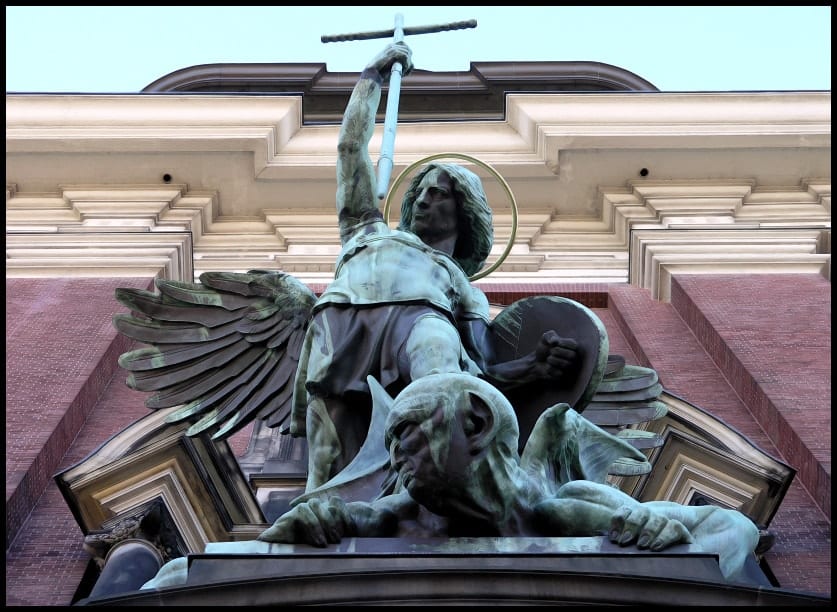Regina Caeli – Queen of Heaven, Rejoice!
The Regina Caeli, Latin for “Queen of Heaven,” is a hymn and prayer ...

This post is also available in: Spanish, Italian
Demons. Satan. Beelzebub. Lucifer. The Devil. Known by various names, evil spirits are to be found in the Bible, both New and Old Testaments. Jesus casts them out and has authority over them. What do we now make of this, living as we do in a scientific age?
To LISTEN to this post read by Dr. Italy, click on the play arrow on the left, directly below this paragraph.
I’ve read many term papers in my day. Most of them are no more than a patchwork of quotes. That’s because college students are smart enough to know that they really can’t say much on their own authority. To make their case successfully, they have to lean on the authority of others more learned than themselves.
That’s exactly how the scribes and Pharisee’s taught in Jesus’ day. “Rabbi Abraham says this. . . Rabbi Gamaliel says that . . .”
So when a new young teacher appears in Capernaum, this is what people expect. They are in for a surprise: he quotes no one else except God’s Word. That’s because there is no one more learned than He. In fact, he happens to be God’s Word made flesh.
But he doesn’t just speak to the humble townspeople this way. When he encounters superhuman forces that strike fear into the hearts of men, he is unruffled. There are no incantations; he does not plead. Rather than Jesus being afraid of them, the demons are afraid of him. Upon encountering him, they shriek. He calmly commands–“shut up and get out.” A moment later all is still. Bystanders marvel; A former victim is now a free man! Word travels fast–little Capernaum happens to be right on a caravan route from Syria to Egypt.
But isn’t all this talk of demons just a relic of the mythological world view of a pre-scientific age? After all, these primitive folks don’t know about mental illness, chemical imbalance, viruses, and bacteria. Surely they were just attributing to supernatural causes what they could not understand.
That sounds very sophisticated, but it’s dead wrong. First of all, demons are not supernatural at all. Super-natural means above and beyond nature or creation–in other words, uncreated and transcendent. Only God qualifies for this label.
St. Thomas Aquinas called the realm of angels and demons “preternatural” since it escapes the sensory knowledge that we can have of the rest of creation. We human beings were created by God as enfleshed spirits. But divine revelation tells us that God also created pure spiritual beings with the same freedom we have. Those who chose to use that freedom to serve God we call “angels” or messengers. Those who decided to use their freedom to defy God are called demons. Pride and envy lead them to hate not only God, but also us who are made in God’s image and likeness.
So people in Jesus day had good cause to fear demons–they are hostile and powerful. Plus, their intelligence is superior to ours–note that the demon in the story, unlike the humans, instantly recognized who Jesus was.
OK, the ancients may have attributed too much to demonic influence, but moderns tend to make the opposite error. The existence of the angelic and demonic realm is part of the ordinary teaching of the Church’s Magisterium, clearly reaffirmed by Popes Paul VI, John Paul II, Benedict and Francis. In fact when we say in the Creed that we believe in the Creator of heaven and earth, “of all things visible and invisible,” the invisible things refer precisely to this world of angelic and demonic spirits.

So why is it important to believe that such creatures exist?
Because the first rule of warfare is to know your enemy. Paul tells us clearly in Ephesians 6:12 – Our battle is not against human forces but against the principalities and powers . . . the evil spirits.
Only God has power over this world. Jesus, in commanding the demons, as later in the Gospel he commands the wind and the waves, does only what God can do. Once we are joined to Christ, the enemy has no more authority or power over us. Unless, of course, we voluntarily give it to him through sin. If we cling to the Lord and listen to him, we have nothing to worry about. If not, we have lots to worry about.
This post focuses on spiritual warfare and Jesus’s authority over demons or evil spirits. It is a reflection upon the readings for the 4th Sunday in Ordinary Time, liturgical cycle B (Deut. 18:15-20,10; Ps. 95, I Cor. 7:32-35; Mk. 1:21-28).
For a related post, read Peter Kreeft’s excellent essay on HELL.
For a related PODCAST on Spiritual Warfare, listen to the SWORD OF THE SPIRIT.
In-text image from St. Michael the Archangel Church, Hamburg. Public Domain
Banner/featured image by an unknown photographer. Public domain.
mark mercer
Posted at 17:13h, 30 JanuaryDemons are not satan and satan is not a demon.
Marcellino D'Ambrosio
Posted at 17:13h, 30 JanuaryActually, in the Christian tradition, demons are just another name for evil spirits. Satan, Lucifer, Beelzebub, and the devil are all names for the leader of the evil spirits, but he is himself an evil spirit. Since all demons are essentially under the command of Satan, sometimes the person seeking to cast out the demonic forces addresses these forces in the name of their leader, Satan.
mark mercer
Posted at 17:13h, 30 JanuaryThank you for the response. But the subject is far deeper. Demons are not fallen angels. The Scriptures are clear in telling us that demons knew Jesus was the Son of God. When satan tempts Jesus in the desert, satan isn’t sure about who Jesus was. (Plus Mary of Agreda in the City of God reveals strongly that the devil didn’t know who Jesus was.) Also Scripture never calls Satan a demon. Nor does Scripture call demon’s satan.
Demon’s are God’s punishment for being hypocrites. You can only be “clean” of demons by the word of God. Jesus means “woe” to you hypocrites for good reason. This subject is very deep.
Marcellino D'Ambrosio
Posted at 17:13h, 30 JanuaryMark, I am a Catholic theologian who interprets the sacred scriptures according to sacred Tradition and the Magisterium, the official teaching of the successors of the apostles. I would refer you to the Catechism of the Catholic Church par 391-195,538-40 and 550. The theories you share here are intriguing but are not in accord with Tradition & Magisterium. What is shared by Mary of Agreda in the City of God are not public revelation. The Church does not vouch for them. As at best private revelation, they cannot be a sure source of doctrine.